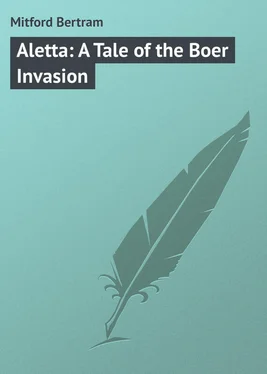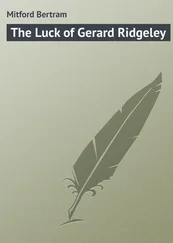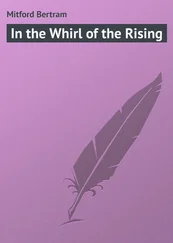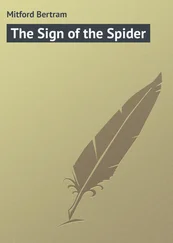Bertram Mitford - Aletta - A Tale of the Boer Invasion
Здесь есть возможность читать онлайн «Bertram Mitford - Aletta - A Tale of the Boer Invasion» — ознакомительный отрывок электронной книги совершенно бесплатно, а после прочтения отрывка купить полную версию. В некоторых случаях можно слушать аудио, скачать через торрент в формате fb2 и присутствует краткое содержание. Жанр: foreign_prose, на английском языке. Описание произведения, (предисловие) а так же отзывы посетителей доступны на портале библиотеки ЛибКат.
- Название:Aletta: A Tale of the Boer Invasion
- Автор:
- Жанр:
- Год:неизвестен
- ISBN:нет данных
- Рейтинг книги:4 / 5. Голосов: 1
-
Избранное:Добавить в избранное
- Отзывы:
-
Ваша оценка:
- 80
- 1
- 2
- 3
- 4
- 5
Aletta: A Tale of the Boer Invasion: краткое содержание, описание и аннотация
Предлагаем к чтению аннотацию, описание, краткое содержание или предисловие (зависит от того, что написал сам автор книги «Aletta: A Tale of the Boer Invasion»). Если вы не нашли необходимую информацию о книге — напишите в комментариях, мы постараемся отыскать её.
Aletta: A Tale of the Boer Invasion — читать онлайн ознакомительный отрывок
Ниже представлен текст книги, разбитый по страницам. Система сохранения места последней прочитанной страницы, позволяет с удобством читать онлайн бесплатно книгу «Aletta: A Tale of the Boer Invasion», без необходимости каждый раз заново искать на чём Вы остановились. Поставьте закладку, и сможете в любой момент перейти на страницу, на которой закончили чтение.
Интервал:
Закладка:
“Hallo, Marthinus, that’s a little too loud,” cut in Colvin Kershaw with a laugh. “Why, man, how about that old springbuck ram I saw you miss twice running that shoot we had at Tafelfontein at the end of last season there, oerkant , by the vlei? He wasn’t a step over four hundred yards. Come now, what would you do with your runaway man at five hundred?”
“That’s true,” assented Marthinus a little crestfallen. Then brightening up: “But then the English newspaper man would be running too hard. Ja, kerelen . Now, an English newspaper man would run!”
“Do you know how I was taught to shoot, Colvin?” asked a wiry, middle-aged Boer with a long light beard, pushing his tobacco bag made of dressed buckskin across to the Englishman. “When I was eight years old my father used to put a loaded rifle into my hand. It was a muzzle-loader – we had no Martinis or Mausers in those days. Maagtig – no. He didn’t give me a second charge for reloading either. He would start me out into the veldt at daybreak, and if I returned without having shot a buck I got no breakfast. Then he would start me off again, and if I returned a second time without having shot a buck I was allowed some dinner, but first of all I got plenty of ‘strop.’ Then I was turned out again, and if I failed again I got still more ‘strop,’ and went to bed without any supper. But it was not more than two or three times that happened. Nee, kerelen ! Well, that is the way to teach a youngster to shoot.”
“That’s all very well, Izaak,” replied Colvin; “but it might be the way to teach some youngsters not to shoot. The fact of knowing they hadn’t another chance might get upon their nerves and make them miss.”
But the other, whose name was Izaak van Aardt, and who was known amongst his neighbours as second to none for a sure and deadly game shot, only shook his head, unconvinced.
“But,” struck in the young Dutchman who had started the chaff about the Transvaal tobacco, “it is only English youngsters who have nerves. Boer youngsters have no nerves.” And he winked at the others as at first.
“Haven’t they?” responded Colvin Kershaw, with a tranquil smile. “No, especially when you tell them some yarn about the spoek that comes out of the waggon-house at night and yells.”
They laughed somewhat foolishly at this, the point being that Boer children, filled up as they are with all sorts of Hottentot stories, weird and grotesque, are no more intrepid under the circumstances named than would be other children.
The above conversation, however, was significant of two things. One was the high-pitched tension to which racial feeling had attained among the northern border Dutch. It bristled with sly digs, and open ones too, at the English. They could no more keep such out of their conversation than could Mr Dick keep King Charles’s head out of his classic memorial. The second was the exceedingly friendly terms upon which this one Englishman, alone in their midst, stood towards them. Had it been otherwise, while they would have refrained from intentionally saying anything that might have been offensive to their fellow-guest, and one held in so much esteem by the people under whose roof they found themselves, they would have sat taciturn and constrained, confining the conversation for the most part to heavy monosyllables. And as emphasising these two points it is worthy of record.
Now the talkers began to break up, some, however, remaining rooted to their chairs, talking out the situation with increasing vehemence. Others went out to see after their horses, while others again had convened music in the other room. The Boer, as a rule, is fond of music, even if it takes no more aspiring form than the homely strains of a concertina; and whereas both the De la Rey girls could play, and one could sing, fairly, well, their audience listened with a whole-hearted appreciation not always to be found under like circumstances in the drawing-rooms of the fashionable and of the would-be artistic. Colvin Kershaw likewise was in great request, for he had a smattering of ear knowledge which enabled him to rattle off snatches from most of the comic operas of the day, and these were hugely in favour with his somewhat primitive hearers. He could, too, on occasions, as when performing for the benefit of some old-fashioned and highly orthodox old “Tanta” who deemed all secular music an invention of Satan for the snaring of souls, turn such and similar lively strains, by an alteration of time and expression, into the most solemn and soul-stirring of psalm tunes; to the convulsive, because concealed, delight of Andrina and Condaas and others in the know, and to the ecstatic edification of the antiques aforesaid, who would go away thinking that if only “Mynheer” would induce the performer to play on the harmonium in church on Sunday, what a long way they would travel in order to be present.
But the lighter side of life is never far removed from the momentous, and this was represented in another part of the house, whose owner was closeted in long and earnest conversation with “the Patriot.”
“You are the man we want, Brother De la Rey,” the latter was saying in his quick, emphatic voice, having spent an hour setting forth his mission in all its fulness, and that with the convincing earnestness of a man who thoroughly believes in it. “Just consider. The whole of this district is with us, and not merely the whole of this district but the whole of the Northern border. Others, too, as far as the seaboard on one side and the Cape on the other. You cannot stand aloof. You cannot be the only one to refuse to side with your countrymen, those of your own blood, in their struggle for freedom and power.”
“We had better not talk too much about freedom,” was the reply, with a grave head-shake, “I should like to know, Brother Botma, under what Government we could enjoy greater freedom than that under which we are now living.”
“‘Under which?’ Yes, that is just it. ‘Under which.’ But we ought not to be living ‘under’ any Government but our own. Our independence – that is the star to which our eyes turn. That you yourself dwell happy and in comfort here, Stephanus De la Rey, is but an unworthy way of looking at it. Are the ties of blood-brotherhood nothing? Are the ties of nationality nothing? Is our independence nothing? Selfish considerations must be thrown away now. Why, even you have two sons with us. They will fight in our ranks. Will you, then, fight in those of the enemy?”
“I do not desire any fighting. I deplore this trouble. If the Kafirs were to rise, for instance, I do not think you would find me backward. Ask those who know me if I am not speaking true. But this is a struggle between white men, and in a land, too, where they ought to be brothers.”
“Brothers? We and the English can never be brothers. Listen, Stephanus,” laying an impressive hand upon the other’s arm. “It is a struggle for life and death between us and them. To this end they have been working. To this end have they been throwing all their adventurers into our land. Yes; how many from this country, this very British colony you are so proud to belong to, have come to us without a penny – unable even so much as to make a living under the British flag – have come to us on the very verge of bankruptcy, and actually through it – to make not merely a living, but in many cases large fortunes? And these are the people with a grievance! These are the people who fatten on our land, and then want to seize it because it is richer than theirs. That is why they desire the franchise, that they may oust the burghers who fought for their independence; whose fathers shed their blood like water in withstanding the heathen savage, who went forth determined never again to submit to the English yoke.”
Читать дальшеИнтервал:
Закладка:
Похожие книги на «Aletta: A Tale of the Boer Invasion»
Представляем Вашему вниманию похожие книги на «Aletta: A Tale of the Boer Invasion» списком для выбора. Мы отобрали схожую по названию и смыслу литературу в надежде предоставить читателям больше вариантов отыскать новые, интересные, ещё непрочитанные произведения.
Обсуждение, отзывы о книге «Aletta: A Tale of the Boer Invasion» и просто собственные мнения читателей. Оставьте ваши комментарии, напишите, что Вы думаете о произведении, его смысле или главных героях. Укажите что конкретно понравилось, а что нет, и почему Вы так считаете.












